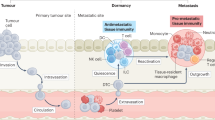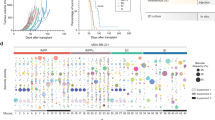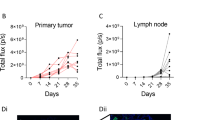Abstract
When injected i.v. into mice, the F10 subline of B16 melanoma cells produced significantly more lung tumours over a 3-week period than cells of the F101.r-6 subline. However, in animals bearing intramuscular tumours produced by these sublines, the high pulmonary-colonization potential of the F10 cells was not realized, and no significant differences in natural pulmonary metastasis formation were observed in animals with untreated primary cancers, even when they progressed to the moribund state. Massage of i.m. tumours derived from the two sublines produced no change in metastasis and no changes in the numbers of cancer cells in the blood detectable by bioassay. In contrast, massage increased metastasis from tumours derived from an invasive BL6 subline and B16 wild-type cells and, in the case of the wild-type, the numbers of circulating cancer cells. in vitro experiments show that blood cells from non-tumour-bearing animals are toxic to both sublines, but less to F10 than to F101.r-6. In addition, after i.v. injection of radiolabelled cells, more of the F10 subline were retained in the lungs of recipients than the F101.r-6. In spite of these apparent metastatic advantages of the F10 subline following intravasation, the incidence of natural metastases from i.m. F10 and F101.r-6 tumours was similar, suggesting that substantially fewer F10 than F101.r-6 cells gained access to the circulation. Thus, the higher colonization potential of the F10 cells was not matched by its intravasation potential, since metastatic efficiency is determined by the least efficient step in the metastatic process.
This is a preview of subscription content, access via your institution
Access options
Subscribe to this journal
Receive 24 print issues and online access
$259.00 per year
only $10.79 per issue
Buy this article
- Purchase on Springer Link
- Instant access to full article PDF
Prices may be subject to local taxes which are calculated during checkout
Similar content being viewed by others
Rights and permissions
About this article
Cite this article
Weiss, L., Mayhew, E., Rapp, D. et al. Metastatic inefficiency in mice bearing B16 melanomas. Br J Cancer 45, 44–53 (1982). https://doi.org/10.1038/bjc.1982.6
Issue Date:
DOI: https://doi.org/10.1038/bjc.1982.6
This article is cited by
-
TRAIL receptor-induced features of epithelial-to-mesenchymal transition increase tumour phenotypic heterogeneity: potential cell survival mechanisms
British Journal of Cancer (2021)
-
Quantification of cancer cell extravasation in vivo
Nature Protocols (2016)
-
A new hypothesis for the cancer mechanism
Cancer and Metastasis Reviews (2012)
-
The metastatic niche: adapting the foreign soil
Nature Reviews Cancer (2009)
-
Current views concerning the influences of murine hepatic endothelial adhesive and cytotoxic properties on interactions between metastatic tumor cells and the liver
Comparative Hepatology (2005)



